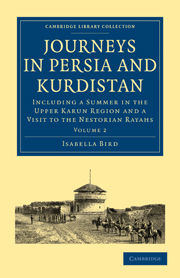 Journeys in Persia and Kurdistan
Journeys in Persia and Kurdistan Book contents
- Frontmatter
- LIST OF ILLUSTRATIONS
- LETTER XVI
- LETTER XVII
- LETTER XVIII
- LETTER XVIII (Continued)
- LETTER XIX
- LETTER XX
- LETTER XXI
- LETTER XXII
- LETTER XXIII
- LETTER XXIV
- LETTER XXV
- LETTER XXV (Continued)
- LETTER XXVI
- NOTES ON PROTESTANT MISSIONS IN URMI
- LETTER XXVII
- FAREWELL IMPRESSIONS OF PERSIA
- LETTER XXVIII
- LETTER XXIX
- LETTER XXIX (Continued)
- LETTER XXX
- LETTER XXXI
- LETTER XXXII
- LETTER XXXIII
- LETTER XXXIV
- LETTER XXXV
- APPENDIX A
- APPENDIX B
- INDEX
- Plate section
- Frontmatter
- LIST OF ILLUSTRATIONS
- LETTER XVI
- LETTER XVII
- LETTER XVIII
- LETTER XVIII (Continued)
- LETTER XIX
- LETTER XX
- LETTER XXI
- LETTER XXII
- LETTER XXIII
- LETTER XXIV
- LETTER XXV
- LETTER XXV (Continued)
- LETTER XXVI
- NOTES ON PROTESTANT MISSIONS IN URMI
- LETTER XXVII
- FAREWELL IMPRESSIONS OF PERSIA
- LETTER XXVIII
- LETTER XXIX
- LETTER XXIX (Continued)
- LETTER XXX
- LETTER XXXI
- LETTER XXXII
- LETTER XXXIII
- LETTER XXXIV
- LETTER XXXV
- APPENDIX A
- APPENDIX B
- INDEX
- Plate section
Summary
Kochanes, Oct. 27.
After two days the Patriarch arrived from Gahgoran with nearly forty persons. To realise what this house is like, one must go back four centuries, to the mode of living of the medieval barons of England. Mar Shimun is not only a spiritual prince, but the temporal ruler of the Syrians of the plains and valleys, and of the Ashirets or tribal Syrians of the mountains of Central Kurdistan, as well as a judge and a salaried official of the Turkish Government. He appoints the maleks or lay rulers of each district, where the office is not hereditary, and possesses ecclesiastical patronage. For over four centuries the Patriarch has been of the family of Shimun, which is regarded as the royal family; and he is assisted in managing affairs by a “family council.” Kochanes is thus the ecclesiastical and political metropolis of the Syrian nation, and the innumerable disputes which arise among the people of this region are brought here for judgment and arbitration.
It is a crowded life. From sunrise to sunset the pavement outside the rude hall of entrance, the great room, like that at Marbishu, where Sulti presides, and the guest-chambers, are always thronged with men waiting to be received by the Patriarch, sleeping on the big settle in the hall, or cleaning swords and guns, or wrestling, performing feats of horsemanship, playing chess, and eating.
- Type
- Chapter
- Information
- Journeys in Persia and KurdistanIncluding a Summer in the Upper Karun Region and a Visit to the Nestorian Rayahs, pp. 288 - 313Publisher: Cambridge University PressPrint publication year: 2010First published in: 1891
